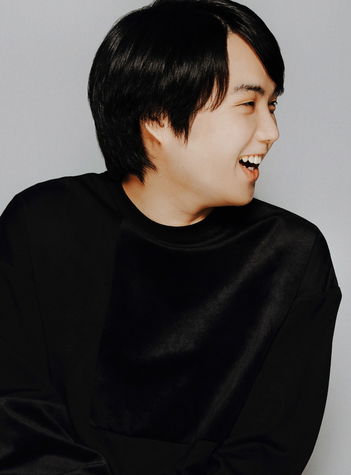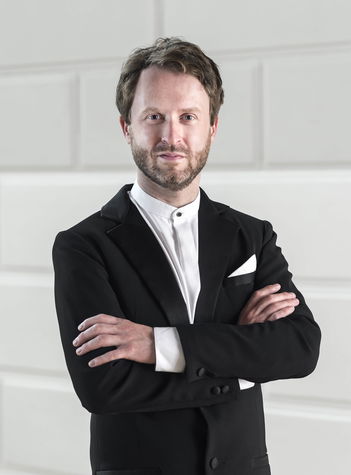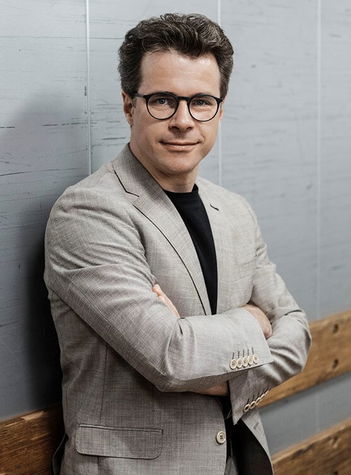Programme
Vítězslava Kaprálová
Military Sinfonietta, Op. 11
Antonín Dvořák
Piano Concerto in G minor, Op. 33
Leoš Janáček
Glagolitic Mass, cantata for vocal soloists, choir, orchestra and organ to an Old Church Slavonic text
For its second evening London’s BBC Proms, the Czech Philharmonic and its Principal Guest Conductor Jakub Hrůša have prepared a special programme: the seldom played Military Sinfonietta by Kaprálová, written during the late 1930s, will be presented alongside Dvořák’s Piano Concerto with soloist Mao Fujita. The finale comes in the form of Janáček’s monumental Glagolitic Mass.
Vítězslava Kaprálová
Military Sinfonietta, Op. 11
Antonín Dvořák
Piano Concerto in G minor, Op. 33
Leoš Janáček
Glagolitic Mass, cantata for vocal soloists, choir, orchestra and organ to an Old Church Slavonic text
Mao Fujita piano
Corinne Winters soprano
Bella Adamova alto
David Butt Philip tenor
Brindley Sherratt bass
Christian Schmitt organ
Prague Philharmonic Choir
Lukáš Vasilek choirmaster
Jakub Hrůša conductor
Czech Philharmonic

Mao Fujita piano

With an innate musical sensitivity and naturalness to his artistry, 26-year old pianist Mao Fujita has already impressed many leading musicians as one of those special talents which come along only rarely, equally at home in Mozart as the major romantic repertoire.
Born in Tokyo, he began piano lessons at the age of five and won his first international prize in 2010 at the World Classic in Taiwan. While still studying at the Tokyo College of Music in 2017, he took First Prize at the prestigious Concours International de Piano Clara Haskil in Switzerland, which brought him to the attention of the international music community for the first time. He was also the Silver Medalist at the 2019 Tchaikovsky Competition in Moscow.
Fujita has been invited to appear in recital at major international festivals and made US recital debut at Carnegie Hall in January 2023. Recent orchestral highlights include performances with the Gewandhausorchester, Munich Philharmonic, Royal Philharmonic or Royal Concertgebouw. In November 2021, Fujita signed an exclusive multi-album deal with Sony Classical International (Mozart’s complete piano sonatas, 72 Preludes by Chopin, Scriabin, and Yashiro). He is a member of Konzerthaus Dortmund’s series "Junge Wilde" from the 24/25 season.
Corinne Winters soprano
Bella Adamova mezzo-soprano

Bella Adamova, mezzo-soprano and improviser, grew up in Prague, surrounded by many cultures. This has translated to a versatility as a musician – always occupying the space somewhere in between genres. The “Rising Star” of the BBC Music Magazine, who studied in London, Cologne, Basel, and Hannover, has won numerous awards at international competitions. Most recently, in summer 2022, she received the main prize in the Oratorio category at the prestigious International Vocal Competition in 's-Hertogenbosch, the Netherlands, and second place in the Lied Duo category with pianist Malte Schäfer at the international competition “Franz Schubert and Modern Music” in Graz, Austria. Although the focal point of her artistic interest is the song, she also devotes herself to opera and oratorio – in March 2024 she makes her debut at the National Theatre in Prague as the Third Wood Sprite in a new production of Rusalka. Her repertoire ranges from Baroque to contemporary music, including works especially written for her.
David Butt Philip tenor
Brindley Sherratt bass
Christian Schmitt organ
Prague Philharmonic Choir
The Prague Philharmonic Choir (PPC), founded in 1935 by the choirmaster Jan Kühn, is the oldest professional mixed choir in the Czech Republic. Their current choirmaster and artistic director is Lukáš Vasilek, and the second choirmaster is Lukáš Kozubík.
The choir has earned the highest acclaim in the oratorio and cantata repertoire, performing with the world’s most famous orchestras. In this country, they collaborate regularly with the Czech Philharmonic and the Prague Philharmonia. They also perform opera as the choir-in-residence of the opera festival in Bregenz, Austria.
Programmes focusing mainly on difficult, lesser-known works of the choral repertoire. For voice students, they are organising the Academy of Choral Singing, and for young children there is a cycle of educational concerts.
The choir has been honoured with the 2018 Classic Prague Award and the 2022 Antonín Dvořák Prize.
Lukáš Vasilek choirmaster

Lukáš Vasilek studied conducting and musicology. Since 2007, he has been the chief choirmaster of the Prague Philharmonic Choir (PPC). Most of his artistic work with the choir consists of rehearsing and performing the a cappella repertoire and preparing the choir to perform in large-scale cantatas, oratorios, and operatic projects, during which he collaborates with world-famous conductors and orchestras (such as the Berlin Philharmonic, the Czech Philharmonic, the Israel Philharmonic, and the Saint Petersburg Philharmonic).
Besides leading the PPC, he also engages in other artistic activities, especially in collaboration with the vocal ensemble Martinů Voices, which he founded in 2010. As a conductor or choirmaster, his name appears on a large number of recordings that the PPC have made for important international labels (Decca Classics, Supraphon); in recent years, he has been devoting himself systematically to the recording of Bohuslav Martinů’s choral music. His recordings have received extraordinary acclaim abroad and have earned honours including awards from the prestigious journals Gramophone, BBC Music Magazine, and Diapason.
Jakub Hrůša principal guest conductor

Born in the Czech Republic, Jakub Hrůša is Chief Conductor of the Bamberg Symphony, Music Director Designate of the Royal Opera, Covent Garden (Music Director from 2025), and Principal Guest Conductor of the Czech Philharmonic. He was also formerly Principal Guest Conductor of the Orchestra dell’Accademia Nazionale di Santa Cecilia, the Philharmonia Orchestra, and Tokyo Metropolitan Symphony Orchestra.
He is a frequent guest with the world’s greatest orchestras, including the Vienna, Berlin, Munich and New York Philharmonics; Bavarian Radio, NHK, Chicago and Boston Symphonies; Leipzig Gewandhaus, Lucerne Festival, Royal Concertgebouw, Mahler Chamber and The Cleveland Orchestras; Orchestre Philharmonique de Radio France, and Tonhalle Orchester Zürich. He has led opera productions for the Salzburg Festival (Káťa Kabanová with the Vienna Philharmonic in 2022), Vienna State Opera, Royal Opera House, and Opéra National de Paris. He has also been a regular guest with Glyndebourne Festival and served as Music Director of Glyndebourne On Tour for three years.
His relationships with leading vocal and instrumental soloists have included collaborations in recent seasons with Daniil Trifonov, Mitsuko Uchida, Hélène Grimaud, Behzod Abduraimov, Anne Sofie Mutter, Lisa Batiashvili, Joshua Bell, Yefim Bronfman, Rudolf Buchbinder, Gautier Capuçon, Julia Fischer, Sol Gabetta, Hilary Hahn, Janine Jansen, Karita Mattila, Leonidas Kavakos, Lang Lang, Josef Špaček, Jean-Yves Thibaudet, Yuja Wang, Frank Peter Zimmermann, Alisa Weilerstein and others.
As a recording artist, Jakub Hrůša has received numerous awards and nominations for his discography. Most recently, he received the Opus Klassik Conductor of the Year 2023 prize and the ICMA prize for Symphonic Music for his recording of Bruckner’s Symphony No. 4, and the Preis der Deutschen Schallplattenkritik for his recording of Mahler’s Symphony No. 4, both with Bamberg Symphony. In 2021, his disc of Martinů and Bartók violin concertos with Bamberg Symphony and Frank Peter Zimmermann was nominated for BBC Music Magazine and Gramophone awards, and his recording of the Dvořák Violin Concerto with the Bavarian Radio Symphony and Augustin Hadelich was nominated for a Grammy Award.
Jakub Hrůša studied at the Academy of Performing Arts in Prague, where his teachers included Jiří Bělohlávek. He is President of the International Martinů Circle and The Dvořák Society. He was the inaugural recipient of the Sir Charles Mackerras Prize, and in 2020 was awarded both the Antonín Dvořák Prize by the Czech Republic’s Academy of Classical Music, and – together with Bamberg Symphony – the Bavarian State Prize for Music.
Vítězslava Kaprálová
Military Sinfonietta, Op. 11
Antonín Dvořák
Piano Concerto in G minor, Op. 33, B63
Dvořák was already a composer of genius by 1876, when he wrote his Piano Concerto in G minor, Op. 33, but he was basically known only to the Prague public. At the time, he had to earn a very modest living as an organist and by giving piano lessons privately. In those days, the pianist Karel Slavkovský was devoting considerable attention to music by Czech composers. On 24 March 1878, it was he who played was the first to play the solo part of Dvořák’s new work in the hall at Prague’s Žofín Palace. A second performance, again in Prague and with the same pianists, took place two years later. At that time, shortly after the extraordinary success of Dvořák’s Moravian Duets and of the Slavonic Dances in Germany, he was receiving offers from important publishers. One of them, Julius Hainauer from Breslau, published the concerto in 1883. Before publication, Dvořák made major revisions to the score, giving the work its ideally polished sound. His concerto was ahead of its time in many ways, and that had negative consequences. Some music critics (although a small minority) saw the work’s departures from the usual as weaknesses, while others were blinded by their aversion to Czech patriotism, an entirely irrelevant objection in the case of Dvořák. Despite such voices, the composer maintained a very detached perspective. After an otherwise successful concert in Berlin in 1884, Dvořák wrote to the piano virtuoso Anna Grosser: “All this criticism overflowing with ridicule, hatred, and bile (more like an execution) provides me with plenty of amusement and entertainment. Things keep getting crazier, but those gentlemen in Berlin still will not stop me from taking flight!”
The critics did not keep the composer from taking flight, but his Piano Concerto remained grounded to some extent. The concerto continued to be played over the following years, but notably less often than other great works by Dvořák. An important chapter in the performance history of the concerto in the 20th century belongs to an arrangement of the solo part made by the Prague piano virtuoso and teacher Vilém Kurz 15 years after Dvořák’s death. Several of his pupils and other pianists played the concerto in that form even long after such arrangements had ceased to be fashionable, when, to the contrary, there were increasing efforts towards the most faithful possible interpretations of composers’ intentions. The soloist for today’s concert, András Schiff, has clear reasons for playing Dvořák’s own version. More and more pianists have begun doing so in recent decades, but the work is still performed less often overall than other concertos. The key to an explanation may be the words of the phenomenal pianist Sviatoslav Richter, who only played Dvořák’s own version. Richter certainly did not suffer from technical limitations, but he always “merely” had to get to the heart of a work and understand it. In November 1977, he wrote in his diary: “I recall how long it took me to learn this [Dvořák’s] concerto (nearly three years), while I learned Bartók’s Second Piano Concerto in just two months without having any special difficulties.” This may be another reason why it is hard to find another work like Dvořák’s Piano Concerto: brilliant yet seldom heard.
Leoš Janáček
Glagolitic Mass, a cantata for soloists, choir, orchestra and organ
Among great creative figures, Leoš Janáček is remarkable in that the older he got, the more “youthful”, original, and modern the music that he wrote became. This was perhaps because he had lost everything. Released by the cruelty of fate from his ties and concerns for his parents and his children, he was truly able to find himself. He cast aside conventions and tried to get to the heart of things.
Janáček’s Glagolitic Mass is one of the most powerful sacred compositions in music history. The 72-year-old composer wrote the music to the text in Old Church Slavonic in 1926 at his favourite spa, Luhačovice. “The rain in Luhačovice is pouring, just pouring. I look out of the window at the gloomy mountain Komoň. The clouds come rolling in, and the wind tears and scatters them. […] The darkness becomes denser and denser. Now I look out into the black of night; lightning slashes into the darkness.” That is how Janáček described the atmosphere that August, when he began writing his Glagolitic Mass. The decision was made quickly. Although he had taken an interest in the Old Church Slavonic text of the Mass a few years beforehand and had made a few sketches, the music that he ultimately began writing in Luhačovice had nothing in common with those sketches. For Janáček, starting the new work was quite emotional. His ideas had to mature, but once creative fervour had taken hold, he composed quickly. He sketched out the entire Mass in just three weeks! By October 1926, he had finished it. He made more quite substantial changes after the premiere, which took place on 5 December 1927 in Brno. Janáček was able to make cuts. He is never verbose; he is precise.
For example, in the movement “Věruju” (Credo) he shortened the orchestral interlude that contained a very powerful passage inducing the atmosphere before the choir begins singing about Christ’s crucifixion. Janáček originally scored this harsh passage for three (!) sets of tympani, and he combined them with expressive music for brass and organ. In a letter to Kamila Stösslová he wrote: “…so I’m doing a bit of a depiction of the legend that when Christ was stretched out on the cross, the heavens were torn. So I wrote rumbling and lightning…” His wife Zdena supposedly told him: “Leoš, that’s impossible; you’re cursing at the Lord God there.” And a while later Janáček said: “So I’ve gotten rid of the tympani there…”
Although the Glagolitic Mass is a musical setting of a liturgical text, the work is not confessional in character. To Ludvík Kundera’s review, in which he called the composer an “old man” and a “firm believer”, Janáček’s reply was “No old man, no believer, you youngster”. This is often quoted, but we must take it with a grain of salt. Janáček was unquestionably a spiritual person. He was raised in the environment of the church at the Benedictine Monastery in Old Brno. However, he was not a practicing Catholic. We know only that he brought his children up in faith and prayer. He apparently felt distanced from the Catholic Church, so he was attracted to the idea of writing a Mass, but to the Old Church Slavonic text.